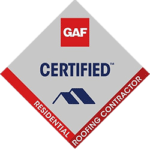
After purchasing a new home, one of the most important decisions you will make is to get your roof inspected and replace any shingles that need replacing. This is because a leaky roof can lead to big problems such as mold, rot, or even stained walls.
Now, you may be wondering what precisely residential roof warranties are and if they’re worth it for you. In this post, we’ll cover all that and more, including the important terms you should know, what a roof warranty covers, what voids such a contract, and what to look for when purchasing a roof warranty.
What Is a Residential Roofing Warranty?
A residential roof warranty is a contract between you and the company that manufactured your roof. The agreement states that if there are any problems with your shingles or installation, they will repair them free of charge.
Understanding The Importance of a Residential Roofing Warranty
A roof warranty ensures that any problems with your shingles or installation are fixed for free. This means no more wondering if you should call the company and schedule a repair, worrying about how much it will cost to get on their schedule, or waiting weeks to get someone out there. With a roof warranty, if something goes wrong, you can rest assured that it will be fixed quickly and affordably.
Roof Warranty Coverage
Many companies offer limited and non-prorated warranties, which require you to pay for the cost of labor. These types of contracts only cover damage due to faulty materials or craftsmanship errors, not general wear and tear or weather conditions like hail. For example, if your shingles are too thin to withstand an intense storm and blow off your roof, the warranty will typically not cover this type of damage.
On the other hand, full coverage residential roof warranties can include components such as wind or hail resistance for free. This is because it covers all possible causes of damages, so there is no need to pay for repairs. This type of warranty can be very beneficial if you are looking for a long-term solution for replacing your roof.
Terms to Know
There are several terms that you will need to know to understand your contract with your roofing company. These terms include:
- Roof warranty: A contract between you and the roofing manufacturer that states if there are any problems with your roof, they will repair them free of charge.
- Limited warranty: A warranty with certain conditions and limitations such as the type of damage covered and/or the expiring date of the coverage agreement.
- Prorated warranty: This is a warranty that reduces in value over the coverage period. It does not cover the full cost of a roof repair. Instead, a prorated warranty will pay a percentage of the replacement cost for an amount that declines over time.
- Non-prorated warranty: This is a warranty covering the full cost of a roof replacement throughout the warranty period.
- Full coverage: A warranty with no expiration date and covers all costs of repairing the roof if there is an issue.
- Warranty period: This is how long the warranty protects you after installing your new home’s exterior. For example, if you bought an asphalt shingle roof with a 15-year warranty period, it means that if any issues come up while it is still under its protection, they will repair or replace it free of charge.
- Roofing contractor: A person who installs the new shingles on your roof.
- Labor: The cost of labor for removing and reinstalling the new roof materials.
- Workmanship: The original installation of the roofing materials by a contractor.
Voiding Your Roof Warranty
It is important to understand what can precisely void your warranty. This way, you can know what to avoid when in contact with your roof. Typically, there are seven things that can void your roofing warranty:
1. Pressure Washer
Using a pressure washer to clean your roof can void the warranty.
2. Improper Installation
If the roof was installed incorrectly, it could void part or all of your warranty.
3. Installing New Shingles Over the Old Ones
Layering new shingles over old ones can save labor costs, but this will allow heat to expand more slowly, which potentially reduces the lifespan of the shingles. It can also cause bulging and damage the overall roof structure. Because of these, the shingles warranty becomes void.
4. Improper Roof Ventilation
Roof ventilation is very important but can cause damage to the roof if it isn’t done properly.
5. Antennas and Satellite Dishes
If your home has an antenna or satellite dish installed on the roof, it can cause damage and void this part of the warranty.
6. Fixtures
Fixtures such as solar panels and skylights can cause damage and void the warranty.
7. Using Non-System Components
If you are using non-system components that the manufacturer has not approved, it can cause damage and void your warranty.
New Owner Roof Warranty Transfers
If the home has changed ownership, it is possible to transfer your warranty. However, the warranty can only be transferred once. This means if the new owner wants to transfer it, they cannot even if the warranty is active.
Tips for Purchasing a Roof Warranty
Every home is different, so make sure you read through your contract carefully before signing it. Look closely at what parts and components are included in the replacement costs that the company will pay. Make sure these items align with your home’s needs. Some warranties will come with a deductible (the amount of money you must pay before the contract starts) that can be an extra cost to consider when purchasing roofing repairs.
Find Your Residential Roof Warranty
As a homeowner, having your residential roofing warranty out of the way is one of the fulfilling things you can brag about. If you are looking for a long-term solution to replace your roof, make sure you purchase a warranty that aligns with your needs. You can contact us if you need more info on all things roofing warranty. We will be more than happy to take you through all you need to know before signing that contract.









